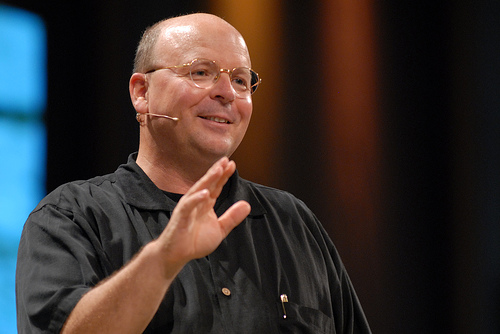In this sixth posting, we are continuing the blog series with content from biblical scholar Scot McKnight. McKnight has recently published New Testament Everyday Bible Study series with HarperChristian Resources. McKnight combines interpretive insights with pastoral wisdom for all the books of the New Testament. Each volume provides original meaning, fresh interpretation, and practical application.
In this blog series, we’ll be sharing Scot’s insights and wisdom on the book of Philippians. It is available as a book as well: Philippians and 1 & 2 Thessalonians: Kingdom Living in Today’s World.
For twelve weeks, Bible Gateway will publish a chapter from the Bible study book, taking you through the full text of McKnight’s study on Philippians. For this week, here is the sixth study, The Common Life of God | Philippians 2:5-11.
5 In your relationships with one another, have the same mindset as Christ Jesus:
6 Who, being in very nature God,
did not consider equality with God something to be used to his own advantage;
7 rather, he made himself nothing
by taking the very nature of a servant, being made in human likeness.
8 And being found in appearance as a man, he humbled himself
by becoming obedient to death— even death on a cross!
9 Therefore God exalted him to the highest place and gave him the name that is above every name, 10 that at the name of Jesus every knee should
bow,
in heaven and on earth and under the earth,
11 and every tongue acknowledge that Jesus Christ is Lord,
to the glory of God the Father.
The common life into which Christians are to grow transcends the business strategy of building a cohesive team, to get along with others in the city of Philippi, or to be effective in ministry. Each may be desirable but there is something profoundly deep about the common life into which Christians are to be formed. What is said in Philippians 2:6 taps into the very nature of God’s very Self. Who Jesus Christ was and is and what Jesus did on earth for us all express the heart of God.
Jesus is what God is like. In Jesus we see God most clearly. His life is the God-shaped life. To deny self- promotion in order to serve others is God-like and godly because it is Christ-like. Lynn Cohick calls us to begin this passage in a way that flows from the previous passage, beginning with the “If” statements in 2:1. That is, since we already are participating in Christ, let us live in a way that reflects the pattern of his life. The common life into which we are called is nothing less than the God-life.
Common Life with One Another
In 2:1–4 Paul exhorted the Philippians to a unity rooted in humility that emerges from being in Christ. That observation rushed Paul immediately to how Jesus him- self conducted himself, which he will set out in a series of poetic lines (notice how the NIV makes our passage poetic).
The challenge is the foundational principle: in Christ we can have a common life that exhibits the way Jesus lived. Peter and John, it was said, impressed the authorities in Jerusalem as “ordinary men” who “had been with Jesus” (Acts 4:13). Others and outsiders who come into the circles of Christian fellowship will be most impressed if we look like we have spent time with Jesus.
Common Life in the Heart of God
Paul now recites (and probably edits) in vv. 6–11 an early Christian poem, and perhaps a hymn, about the pattern of Jesus’ life. And these lines were probably composed for early Christian worship and meditation. They sing into worship the teachings of Jesus himself (Mark 8:31–9:1; John 13). A Roman leader named Pliny observed not long after this letter was written that the Christians assembled to “sing hymns to Christ as if to a god.” This poem in Philippians 2 could have been one of those hymns. It’s worth remembering that, as Marilynne Robinson once said, “Caesar Augustus was also said to be divine” but “there aren’t any songs about him.” We still sing about Jesus.
Here are the important words that take us to the common-life heart of God: “Who, being in the very nature God.” The RSV, ESV, NRSV, NLT, and CEB have “though he was in the form of God” or something close. The word “though” expresses a concession. That is, though he was God and transcendent and invisible and immortal, nonetheless God condescended to become a human. This very traditional interpretation impacted the history of how most Christians have read this text. The Greek behind this is not so explicit as “though” suggests.
Instead of “though,” most recent translations have gone with what can be called a simple, literal translation: “being in the very nature God.” “Being” is the plain sense of the term, no more and no less. The word behind “very nature” is morphē, which points to the defining, visible attributes of Jesus, including equality with God. Many today read “being” as pointing to something innate and essential to who God is. That is, it is God-like for God to extend himself out of love into human form in order to express that love.
It’s complicated, but we need to get this right. Instead of “though,” we should think like the meaning is this: because he was God, or being the kind of God God was, he became human to redeem humans.
Which reveals something profound about our God. God is and always has been and always will be a God who reaches out to others in self-giving love. God the Father loves God the Son and God the Spirit, and the Son loves the Father and the Spirit, and the Spirit loves the Son and the Father. In eternity past God has always been a self- giving God. This is why John says, “God IS love” (1 John 4:16). To love is to give oneself for another, and in loving to encircle them in a common life.
The implication of this reading boggles: we are to share a Christ-like common life because God in God’s own Self is a common-life self-giving God. When we “have the same mindset as Christ Jesus” we experience the heart of God. In Philippians this had to do with such things as sharing resources with one another and supporting the gospel mission to reach others with that gospel. But the common life for them was so profound it affected every dimension of life.
Common Life Embodied in Christ
God’s very self-giving essence was embodied in the pattern of Jesus’ own life. I was taught as a college student to read Philippians 2:6–11 as a “U”: from the throne room of God’s own inner life (2:6), down into human flesh (2:7), then down even further into the degradation of human degradations, death on a cross (2:8), which then turns upward into God’s exaltation of Christ “to the highest place” (2:9) where the crucified One will be One worshiped by all and declared Lord of all (2:10–11). That’s the U–from heaven to earth and back. (The downward-upward imagery, of course, is imagery and not reality. Heaven is no more upward than downward since heaven is wherever God is, and God is everywhere.)
This U-pattern reveals Who God is and how God acts.
As Hawthorne and Martin express this poetically,
“in the divine economy of things, by giving people receive,
by serving they are served,
by losing their lives they find them, by dying they live,
by humbling themselves they are exalted.”
Jesus did not seize or hang on to “equality with God,” and this text affirms as well as any other text in the Bible the deity of Christ (2:6). The NIV’s “used to his own advantage” expresses the very heart of Paul’s challenge to the Philippians. Instead of self-protection and self-promotion, Jesus chose other-protection and other-promotion. Instead of hanging on to glory, Jesus entered into the human condition all the way to the bottom.
Nothing more ignominious can be experienced in the human condition than being a slave (not “servant” as in the NIV) and then, as a slave, suffering the vicious humiliation of the Roman powers crucifying naked and in public a just, good man, which was Jesus’ fate among them.
Think about this: the Way of Jesus counters the Way of Rome, and the Way of Rome has had too much play among the Philippians. So Paul has to remind them all over again about the Way of Jesus. The Way of Jesus is the Way of God.
Notice that these were choices made by Jesus. He “did not consider equality” and “he made himself” and “by taking” and “he humbled himself.” He consciously and intentionally chose the cross-shaped life (cruciformity) at each stage of the journey.
The Son did not surrender divinity but became human as the one equal to God. He was the God-Human, not the Human formerly known as God. Just as mothers and fathers do not cease being parents when they lay on the floor to play with a child and so enter into that child’s world. Jesus’ choices are matched by the Father’s choices to reward him: “God exalted him” and “gave him” so Jesus would be given the glory he deserved.
The challenge to unity through humility, to a Christo-form life, is a choice. No, it is daily choices. In relationship with those we love and those we don’t even like, at home, at play, at work, at church. In the ordinary and in the unusual. We experience glory on the far side of the cruciform life, though at times we glimpse that glory now.
Questions for Reflection and Application
- In what ways does Jesus show us what God is like?
- How does God express God’s love through a life-in-common?
- What is the “U-shaped” pattern of Jesus’ life?
- In what ways does your life look like Jesus, like you have spent time with him?
- What does “cruciform” mean? How can you live a more cruciform, or Christoform, life, especially regarding unity?
The New Testament Everyday Bible Study is published by HarperCollins Resources, a division of HarperCollins Christian Publishing, Inc., the parent company of Bible Gateway.
The post The Common Life with God | Philippians 2:5-11 appeared first on Bible Gateway Blog.











